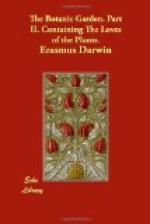From
realm to realm, with cross or crescent crown’d,
Where’er
Mankind and Misery are found,
445 O’er burning sands, deep waves, or wilds
of snow,
Thy
HOWARD journeying seeks the house of woe.
Down
many a winding step to dungeons dank,
Where
anguish wails aloud, and fetters clank;
To
caves bestrew’d with many a mouldering bone,
450 And cells, whose echoes only learn to groan;
Where
no kind bars a whispering friend disclose,
No
sunbeam enters, and no zephyr blows,
HE
treads, inemulous of fame or wealth,
Profuse
of toil, and prodigal of health;
455 With soft assuasive eloquence expands
Power’s
rigid heart, and opes his clenching hands;
Leads
stern-ey’d Justice to the dark domains,
If
not to fever, to relax the chains;
Or
guides awaken’d Mercy through the gloom,
460 And shews the prison, sister to the tomb!—
Gives
to her babes the self-devoted wife,
To
her fond husband liberty and life!—
—The
Spirits of the Good, who bend from high
Wide
o’er these earthly scenes their partial eye,
465 When first, array’d in VIRTUE’S purest
robe,
They
saw her HOWARD traversing the globe;
Saw
round his brows her sun-like Glory blaze
In
arrowy circles of unwearied rays;
Mistook
a Mortal for an Angel-Guest,
470 And ask’d what Seraph-foot the earth imprest.
—Onward
he moves!—Disease and Death retire,
And
murmuring Demons hate him, and admire.”
Here
paused the Goddess,—on HYGEIA’S shrine
Obsequious
Gnomes repose the lyre divine;
475 Descending Sylphs relax the trembling strings,
And
catch the rain-drops on their shadowy wings.
—And
now her vase a modest Naiad fills
With
liquid crystal from her pebbly rills;
Piles
the dry cedar round her silver urn,
480 (Bright climbs the blaze, the crackling faggots
burn),
Culls
the green herb of China’s envy’d bowers,
In
gaudy cups the steamy treasure pours;
And,
sweetly-smiling, on her bended knee
Presents
the fragrant quintessence of Tea.
INTERLUDE II.
Bookseller. The monsters of your Botanic Garden are as surprising as the bulls with brazen feet, and the fire-breathing dragons, which guarded the Hesperian fruit; yet are they not disgusting, nor mischievous: and in the manner you have chained them together in your exhibition, they succeed each other amusingly enough, like prints of the London Cries, wrapped upon rollers, with a glass before them. In this at least they resemble the monsters in Ovid’s Metamorphoses; but your similies, I suppose, are Homeric?
Poet. The great Bard well understood how to make use of this kind of ornament in Epic Poetry. He brings his valiant heroes into the field with much parade, and sets them a fighting with great fury; and then, after a few thrusts and parries, he introduces a long string of similies. During this the battle is supposed to continue; and thus the time necessary for the action is gained in our imaginations; and a degree of probability produced, which contributes to the temporary deception or reverie of the reader.




